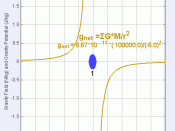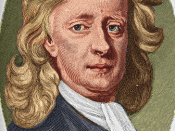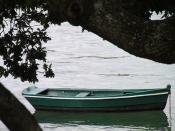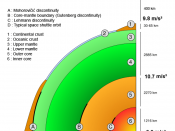"Art upsets, science reassures." This claim was made by cubist painter, Georges Barque. Barque, being a part of the art world, would then be considered an upsetter. This quote may be considered bias because he is solely an artist. However, Barque does not try to glorify art, or threaten that he is correct. Barque states that there is a sort of comfort in science that we can be assured of. A comfort that art cannot always promise the viewer. I believe his statement holds a great validity. This assessment will attempt to understand the underlying meaning of Braque's quote through different examples and interpretations.
"Art upsets." Throughout time art has been linked to personal expression. It depicts the reality of one's feelings, perception of the world, along with any number of other emotions. Art places the artist's passions onto canvas, in the form of sculptures, as well as many other fashions of eloquence.
Art is unique because the observer, who is viewing the work places their own interpretation on the piece. Their critique can be based on their emotional state, knowledge of the artist, or simply their individual perceptions. In many cases, art, itself, has proven to boggle the minds of many because the thoughts of the creator seem to be in the least way manipulative. I believe that this is the root of the "upset" Barque speaks of. Each person in this world interprets complex messages differently. Such a contrast in perception, of the arts, causes individuals to be aggravated with the high possibility of being incorrect.
The use of symbolism, in literature, often causes an obscurity in the interpretation. In Robert Frost's "After Apple Picking," the speaker makes many references to sleep throughout the entirety of the poem. Personally, being familiar with Frost's poetry, I came to believe that this sleep is one which, will grant the retired apple picker renewal from his laborious days. This sleep, in my opinion, is like hibernation of a bear. However, some critics will argue that the sleep is death. These are two entirely dissimilar interpretations, based on different peoples perception, yet no one is to say which is correct. That, I feel, is upsetting.
Theater, thought of art in motion, is yet another example of how manipulation in an art form is celebrated. In Shakespeare's, Hamlet, King of Denmark, the multiple appearances of the ghost are far beyond the reach of reality. Although the tragedy revolves around the ghost of Old King Hamlet, and his message he delivers to his son, the theories of the nature of the ghost are skewed and unclear. I personally see the ghost as a spirit from purgatory, others believe it to be a mere hallucination of Hamlet. The reader is left, quite vague, with only their own opinions of the ghost. This is, yet, another example of art causing grief.
However, Barque was neither poet nor playwright, rather a cubist painter. So his form of art must too, be examined. Pablo Picasso's famous work Guernica depicted the reality of war: anguish, rage, horror. It was clearly presented through violent depictions of amputations, decapitations, and so forth. Picasso left much room for interpretation as well. Many objects represent larger, hidden meanings. The bull in the painting represents Spain. Only a viewer with the knowledge of Picasso may be able to pick this out. Like always, different people interpret distinctive things, because perception is not something that can be limited to one view. Guernica is not only upsetting as a whole depressed piece of artwork, but also because the varying perception of others influenced by their past expectations of Picasso.
"Science reassures." Scientific studies and experiments are drilled into the minds and accepted by the basis of society today. If a painkiller has been tested by the Food and Drug Administration to effectively fight pain, the general public will undoubtedly purchase it. The phrases, proven to, and, studies show/have shown, surround our daily lives and reassure the people that the treatment they are being given is sound. The problem I find in that, is the lack of .justification given. Except, millions of Americans never question if science really does have everything under control as it claims to. This is just how encouraging science is in our everyday lives, ascertaining Barque's quote to be absolutely conclusive. Science attempts to achieve an elementary set of laws that accurately characterize and predict certain unique circumstances. The scientific method involves testing hypotheses and recording the procedure to the greatest detail, in order for the results to be replicated. This method is the principal of science.
The laws of Galileo tell us that if you kick two objects, thus applying a force to them, the heavier one will move more slowly than the lighter one. In contrast, objects being affected by gravity, and starting with the same speed, will have the same speed at all times. Science can assure that if you drop a cracker or a bowling ball, they will both accelerate due to gravity at a rate of 9.80665 m/s2. These properties of gravity were one of the motivations for Einstein's general theory of relativity. Newton's Law of Universal Gravitation explains that all matter attracts all other matter with a force that is equal to the product of their masses and inversely proportional to the square of the distance between them. I have the knowledge to realize that if I jump I will return to ground. Science is something that humans experience from birth. Because of this, it is accepted and reassuring to the general census. These laws remain unchanged. It is not a matter of interpretation by other people. The laws of science can explain the world explicitly.
Equations by Pythagorus and Einstein, developed millennia ago are assured to preform the functions needed. I have never questioned the formulas I have used in the past to find the missing variable. That is how reassuring science is. It is to the point where we do not question the validity or the origin of the equation. Einstein developed E=mc2, the conservation of energy, equals sign, the conservation of mass, and the speed of light. Never even questioning, how accurate this formula is, we assume to simply plug in numbers. Barque's quote is remarkably significant when considering notorious equations that we use still today.
Really then, "Art upsets, science reassures" becomes a matter of subjective versus objective, as well as, real versus reality. Art is a subjective, reality. It is based on the intents of the artist, the actual properties of the work itself, and the reaction of the viewers. A major issue of art concerns the significance of interpretations. I firmly believe that beauty is in the eye of the beholder. Different people may have entirely different perceptions of the artwork, and that is something that cannot be changed. In art, everyone is entitled to their own interpretation, and often these judgements cannot be inaccurate. Art varies exceedingly. I am certain that paintings by Claude Monet are made to give pleasure to the viewer. While far more meaningful and complicated works by surrealist, Salvador Dali, serve to show us truth that lies beyond words. Art upsets because it lacks the unbiasedness the science has.
Science is then objective and real. It exists apart from perception. Regardless of my beliefs in science, it still exists unchanged. Science can be linked to one word alone, success. Science has truly advanced in our society today, but we still use the formula's scientists derived ages ago. The success found in science is presumably due to the scientific method. Such attainment is what allows people to feel reassured about science. These number of steps, involving testing hypotheses and recording the procedure, have allowed for the most brilliant of scientists to replicate experiments to try to create laws. The goal of science is to prove things. The language of science is theories, principles and laws.
In conclusion, I agree wholly with Barque's quote. I feel that art and science are on opposite ends of the spectrum. Art is influenced by perception, science is not. I believe that this is what Barque was trying to express.




